Infinite Riches Read online
Page 2
That was when the community discovered that someone had dumped a bucket of something disgusting in front of her bar. I hurried over to see for myself. The crowd there was solid. Madame Koto seemed quite insane. She lunged at us, uttering the most terrifying threats. Her women stood around, with handkerchiefs to their noses. And right next to Madame Koto’s new car, in the middle of her frontyard, was the appalling bucket. We looked on with fear, knowing that retaliation would come at us in unpleasant ways.
She kept jumping up and down. Cursing. Crying out with the pain of her bad foot and her abnormal pregnancy. She was like a mad witch. In a harsh voice, she ordered her men to fetch people to clear the mess from her barfront. She seemed like her own nemesis. Everyone looked on, thinking about the dead carpenter. Thinking about his son, whom Madame Koto’s driver had killed.
While I watched Madame Koto shrieking, a cool wind blew around me. A flash of dazzling light shot through my brain. Then something nearby electrified my skin. I turned and saw that it was the spirit of Ade. The dead son of the dead carpenter. My friend. In his blue suit, he seemed very healthy. With a mischievous smile, he said:
‘How is my father?’
‘He has been buried,’ I replied.
‘But who killed him?’
‘I don’t know. I saw a thug . . .’
‘Who gave the thug the order?’
‘I’m not sure.’
‘How is your father?’ he asked.
‘He’s asleep.’
‘How do you know?’
‘Because he was fast asleep when I left him.’
‘Your mother was singing when she left you, but she is not singing now.’
‘Why not?’
‘Because she knows something bad is happening.’
‘Where?’
‘I’ll tell you when my father has been buried.’
‘He has.’
‘How do you know?’
‘I was there.’
‘Where?’
‘In the forest.’
‘What forest?’
‘That one.’ I pointed, turning.
But when I looked, I was amazed to find that the forest had vanished. I turned back to my friend, but he too had disappeared. Instead, I saw Madame Koto descending on me. She began hitting me on the head, howling. I ran, fell, and got up. A man in the crowd held me and said:
‘Why do you talk to yourself when your father is in trouble?’
‘What?’ I asked, confused.
‘Wake up!’ he shouted.
I was stunned into a new alertness. Everything was turning too fast. I ran home. The world was spinning. The road kept opening and shutting. Voices were whispering. The forest had reappeared. When I got to our room, five policemen, acting on rumours spread by the Party of the Poor, had come to arrest Dad for the murder of the carpenter.
SEVEN
The arrest
DAD WAS SERENE. He didn’t even smile at the absurdity of their accusation. He put on his boots with a dignity that got on their nerves. The policemen began to hurry and hassle him, but Dad put on his boots more slowly, so they lost their tempers, punching and kicking him. Dad regarded them coolly, with pity almost. I jumped on one of the policemen, who threw me on the bed.
‘Sit still and watch, you cricket!’ Dad said to me, his voice raised.
I sat still. I watched as they dragged him out with only one boot on. Dad didn’t resist, but didn’t comply. They had to carry him out into the street, where our neighbours were gathered, demanding in angry voices why the policemen were arresting a good man. But when the policemen threatened them with imprisonment, everyone fell silent.
We all followed the policemen as they carried Dad to their van. But before they managed to throw him into the back, Dad managed a defiant cry and a cryptic statement:
‘JUSTICE IS A BLACK GOD!’ He shouted.
They slammed the door on his mad voice and drove away before we could find out where they were taking him.
EIGHT
The gathering wrath of women
MUM CAME BACK that evening, having sold very little, her face swollen with the bitterness of the road, her feet blistered, her eyes red with dust.
When she heard that Dad had been arrested for the murder of the carpenter whom he had been brave enough to bury, she immediately set out on the road again. She sang a song which appeared joyful, but which was actually seamed with anger. I followed her down the street but she turned and shouted at me. She said to keep our door open as Dad had commanded, and to remain in the room. She said I had to be their eyes and ears. Reluctantly, I went back home.
With their ears I heard the insistence of Mum’s song to the road that carries people to their unsuspected destinies. I heard her song to the spirits of the dead, who know all the truths obscured to us in pain and ignorance. And I heard her song to the great angels of all women, sisters of justice, handmaidens of fate.
And with their eyes I followed Mum down the roads which keep growing the more human beings dream of places to go. The roads which led to bridges. The bridges which led to highways. The highways built on reclaimed rivers, whose goddesses sue constantly at the higher courts of justice for the annexing of their ancient territories.
Mum walked without knowing where she was going. She walked on rage, her mind dimming and brightening. Incendiary visions flamed in her eyes. She was crossing a road, talking furiously to herself, when she walked into a red space. When she recovered she found lorries all around her, blaring their horns. A crowd of women bore her across the road, fanning her, asking her a thousand questions; and all she said, fighting the waves of her mind’s blackout, was:
‘Police station!’
When one of the women said she knew where the police station was, Mum instantly overcame her dizziness and jumped up and began wildly in the direction indicated. The women followed her, urging her to rest, to recover properly, but Mum pushed on. Her unaccountable single-mindedness magnetized the women. Without knowing why, they accompanied her, as if they were all on the same angry pilgrimage.
The woman who knew the police station led the way. Mum did not speak to the women who accompanied her. She spoke to the road and the air and the wind, complaining about the relentless injustice of the world, singing snatches of defiant village songs. In stirring her spirit, she stirred the women. And the women, chanting and singing, caught the interest of other women who sold beans and roasted corn and fruits along the bustling roadsides. Eternally curious, endlessly harassed by history, the women of the roadside joined the surging mass of women. Their numbers swelled, their flow directed by Mum’s anger.
They poured down the roads, halting the traffic, overwhelming the traffic wardens. They flowed past the law courts whose buildings were changing to the colour of dust. They swarmed past the banks, and past the inquisitive schoolchildren, who joined the women for short distances, and fell away to other distractions.
And when the women got to the police station which used to be a madhouse they were surprised to see the lone figure of a sergeant-major at the desk, filling out his overtime coupon. The poor sergeant-major looked up and found himself overrun by a scary-looking mob of women, all in their different cracked voices demanding the release of husbands, sons, in-laws, brothers, fathers, uncles, and the missing sons of their friends. The sergeant-major panicked and blew his whistle, thinking that colonial order was being overthrown, or that a new war of liberation had been launched. Two policemen in khaki shorts came running out with batons, but the women overpowered them and stormed into the labyrinths of the police station.
The cells were bursting with faces that were like forest carvings and raw-eyed sculptings. The faces of those who battled tirelessly against the colonial order. Faces of the hungry who had turned to crime. The knotted faces of murderers who no longer dreamt at night, no longer slept, but who with paranoid eyes kept awake and ready for the return of the spirits of those they had murdered. The pinched faces of pickpockets from creeks deep in
the country, money-doublers from towns not mentioned on any maps, armed robbers from tribes whose numbers were very small, and whose languages were dying out. The remorseless faces of thugs, who had taken punishment on behalf of their masters, whose lives blazed with a hunger soul-deep, a rage without a language, their faces raw like wounds which have no intention of ever healing. Faces burning with the fierce intensity of the last of a dying breed of men, who would not let the world forget the unique stamp of their soul’s identity. Faces of the half-insane and the downright insane. Faces of university professors who had woken up from their idealistic dreams to find the promises of Independence betrayed in advance, and who had spoken out with all the brashness of those unused to the brackish waters of politics.
The women saw these faces and recognized townspeople, relatives, friends of old enemies, familiar customers. And the police station, with its overcrowded cells, its stench of unwashed bodies and crypts without light, yielded its hoard of vanished names, forgotten heroes, prominent figures in anonymous holes. Among them was a professor insisting that he was a baker, and a money-doubler swearing that he was of royal birth. The prisoners were all weaving in and out of their dissolving identities.
The women, inflamed by their goddess, blurrer of the boundaries of justice, found the keys to the cells and flung open the creaking gates. They unleashed on the roads hordes of criminals who did not dream any more, forgers who believed they were aristocrats, thieves who never said thank you, thugs who had no respect for gratitude. Faces poured out of cells which were big enough for seven standing coffins, and held thirty-six men. But none of the faces was recognized by Mum, and none of the faces belonged to Dad.
Her simple search had undammed so much chaos. All around her the women were revelling in the new dimensions of their power. They sang and spoke boldly. But Mum left the precinct and went on walking, seeking the next police station. Again the women followed her.
The story of their rampage, their cry for an unstated justice, found the ears of the city, the judges, the newspapers, and the night.
They didn’t get very far. The darkness brought Mum exhaustion, but brought the other women exhilaration. Mum sank on the roadside, her feet bleeding, her eyes raw, her mind going on and off, hot lights in her brain.
The women around her, some of them quite mad, others spoiling for a confrontation, planned their next invasion, their next assault on the political structure. While they made their plans, Mum slept with her back to a concrete wall, with the road babbling all around her. She dreamt of all the faces in all the prisons. She dreamt that the freed prisoners were running mad over the city, burning down vehicles and government houses, starting fantastic riots.
NINE
The imprisoned tyger
AND WITH MY parents’ eyes, in my lonely place, I saw Dad in a dark unidentifiable room. It was a room in which they kept murderers, where they created them. Initially, in isolation, they softened their skulls. They softened them for the beating with clubs that was to come at the first excuse, the first question that was not respectfully answered.
Dad saw the leopard again that night. The leopard grew brighter as it neared its death. Dad heard the uncadenced growl of an old beast that knew the ferocity and freedom of prowling the boundaries of dreams, that knew the rage of blood, the salt caves where elephants polish their tusks, and the awesome solitude of the forests.
Dad saw the beast, his being swelling with visions he couldn’t understand. And when, at midnight, they came to question him about the murder of the carpenter, Dad did the most characteristic thing. He raged, interminably, about injustice.
He was surrounded by twelve underpaid policemen, all of them illiterate, all of them irritated by Dad’s crude eloquence. And so they fell on him and beat the phosphorescent leopard out of his brain. They softened the edges of his bones, hoping to dissolve his energies, little realizing that they were doing in thirty minutes what he couldn’t do in thirty years. In beating him as they did they opened the gates of his body, broke down its walls, and shifted the massive rock of his self-limiting ego. In beating him as they did they opened all the doors of his body for his bad blood and dream spirit to come flowing out, through pain and unconsciousness. Then darkness invaded the precincts of his mind.
In the deep night of his body, his brain overwhelmed with visions of blood revenge, Dad saw his father, priest of roads. He saw his father wandering in the village square of his mind, pouring out advice that wasn’t understood, singing proverbs and parables in the deep idiom of a vanishing language. Then his father disappeared. Light shone in his eyes. He heard voices. He felt rusted bars. And found himself among the compact mess of bodies jammed tight in a hot cell. He saw faces marked with gashes. Faces of erratic criminals. Some of them were evangelists. One of them spoke all night long about the agonies of black people. Another insisted justice was an idea invented by the big crooks who run the world, an idea designed to keep small people in their corners.
Dad listened to their farting, their excreting and their cursing. He listened to the insurgent ideas of his fellow inmates, and soaked in the rough secrets of their spirits. Each element he absorbed pushed him outwards into an unknown space between heaven and earth. And that night, because of the visions in his brain, because of the secrets he was soaking in, because the agony of his broken body was too much for his comprehension – expanding and cracking the bowl of his knowledge – he released a frightening cry which sent me running to the door, to the housefront and the street: and I kept looking both ways, because I could smell the fury of his presence. But he was nowhere about. After a while I returned to the room and stayed on the mat, with my back to the wall. A mosquito coil was alight on the table.
I watched our open door. I listened to the footsteps of invisible beings padding up and down our corridor, looking for ways into the lives of unfortified sleepers. And as I listened with all my senses, small amongst the fluid shadows of the room, I heard a new voice singing in the forest.
At last the silence of the forest had been broken. The voice sang in the sweetness of a dirge meant not for the passing away of silence, but for a death announced in advance.
It could have been a spirit or a woman or a bird singing with the voice of humans. Or it could have been a birth uncelebrated. But the night, concentrated in the voice, tightened over our community, and yielded a morning that began with fresh disasters.
TEN
The fantastic ravings of Madame Koto
WHEN I WOKE up, Mum had not returned. My neck was stiff. I cleaned the room, as she would have done. I made food for myself, and ate, and went out to investigate the world. Everywhere I went I asked if anyone had seen Mum. Some said they had seen her that morning, seen her setting out to hawk her wares. A woman even said she had seen Dad prowling about in the forest, shouting.
Neighbours were concerned about Dad’s imprisonment. They wanted to do something. Some talked of going to protest to the Governor-General. Others threatened journeys to police stations and newspaper offices. But no one did anything. The men went to work. The women fed their children, fetched water from the well, and washed clothes. Then we heard that Madame Koto was raving again.
Her cries of a mad bird with broken wings, cries like the sounds of certain musical instruments forbidden to human ears, came over to us in the hot air. We rushed to her barfront, and saw something quite horrible. We saw that someone had placed a coffin on top of her new car. We knew at once that the coffin contained the body of the dead carpenter. It seemed to have been burst open on all sides by the corpse which had been growing during the nights.
We could see the dead carpenter’s head with its snarling mouth full of earth, as if he had died of overeating. His ears were large and black. He had stones in his eye sockets. His hands stuck out from both sides of the coffin, his fingers swollen. His feet were big and frightening; they had grown larger than their shoes. And his gleaming body was the colour of palm oil.
When we saw the coffin and
the grotesque corpse, we let out a collective cry of astonishment and horror, a cry that was silenced by Madame Koto storming at us from the backyard. Her white beads were in her hands and her hands inscribed the air with the crude shapes of nightmares. Her face was swollen and ugly. A wound in her shoulder seeped blood through her expensive lace blouse. She had an aluminium libation on her lips. Her stomach heaved. And her wrapper fell from round her waist, revealing luminous rashes and cicatrices. She began to rage at us. She raged the most startling torrent of confessions, an eruptive flashing thrust of words crowded with burning dreams that held us fast to the shifting earth. Our mouths hung open. Our eyes twitched in the mercury of the sun’s lash. While we listened to many portents within the incoherent rage of Madame Koto’s words, white birds poured out of the cloudless sky, winging down on us in the oddest formations.
‘So what if a man comes to my bar and is blinded by what he shouldn’t have seen?’ she shouted in a jagged voice. ‘So what if I grow fat when all of you have lost your eyes? I did not plant a dead man in ashes. The rock is my mother and I did not eat your children in the wombs of your women. I did not make sores come out in your ears. But, yes, I sit on the head of my enemies. I take power where I find it and if you sleep and let your spirits float about unprotected, I will drink in their secrets. I will speak to the air, such is my nature. But I cannot plant a dead man and reap a bucket of nonsense.’
She glared at us out of insane eyes. Before we could breathe, she plunged back into the hallucinated sea of her rage.

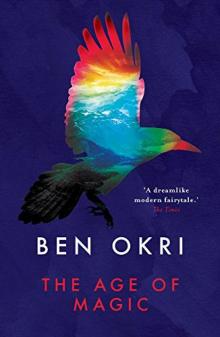 The Age of Magic
The Age of Magic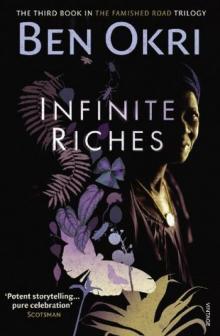 Infinite Riches
Infinite Riches Songs of Enchantment
Songs of Enchantment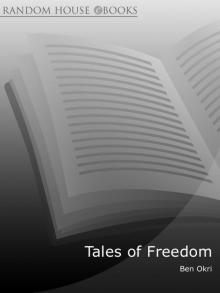 Tales of Freedom
Tales of Freedom Dangerous Love
Dangerous Love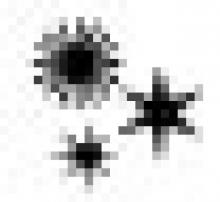 Starbook
Starbook The Famished Road
The Famished Road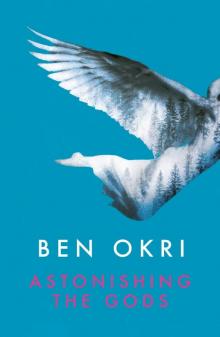 Astonishing the Gods
Astonishing the Gods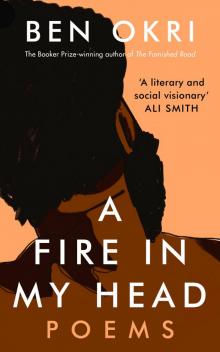 A Fire in My Head
A Fire in My Head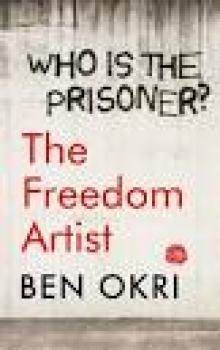 The Freedom Artist
The Freedom Artist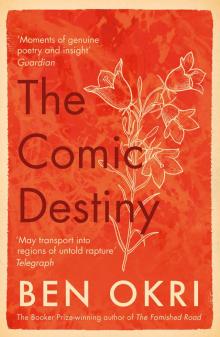 The Comic Destiny
The Comic Destiny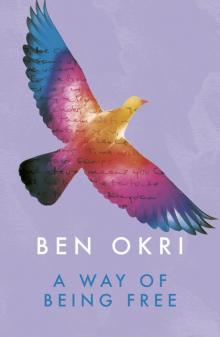 A Way of Being Free
A Way of Being Free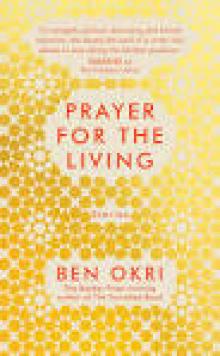 Prayer for the Living
Prayer for the Living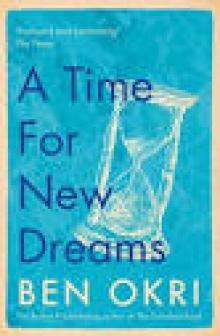 A Time for New Dreams
A Time for New Dreams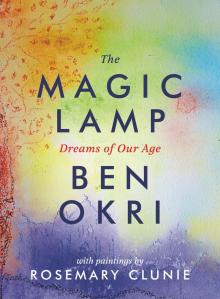 The Magic Lamp
The Magic Lamp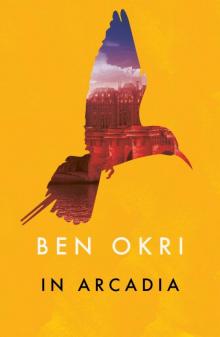 In Arcadia
In Arcadia